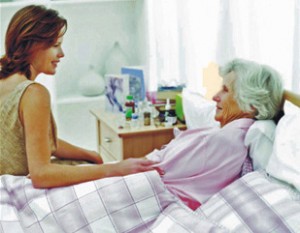Caring at home for a relative with a terminal illness is a time of great emotional and physical strain. It is not easy to make predictions about how long the final stages of an illness will last or how much care a person may need. People whose health is deteriorating have good and bad days and may remain on a plateau for quite a while, supported by medication and nursing care, before they finally slip into unconsciousness. If you are continuing to nurse your relative at home in the terminal stages of their illness, you will be offered sup¬port from the local community nursing team. Specialist palliative care community nurses will be available for advice and support, and work closely with the community nurse from the NHS trust. Arrangements vary around the country: some specialist palliative care community nurses are part of a hospice team, some are Macmillan-trained nurses working from a hospital-based support team or a community team; Marie Curie community nurses provide hands-on nursing care at home, and are available across the coun¬try. The nurses assigned to your relative will assess how much care is needed and will visit several times a day if necessary. In some areas there are special flexible services that provide help to settle patients down at night and give pain-killing and sedative drugs, and all-night nursing services to sit with very ill people. Your relative’s doctor and community nurse will make the necessary arrangements.
 Returning home from hospital or a hospice
Returning home from hospital or a hospice
If your relative has been ill for some time, you will already have some understanding of the system. Nevertheless, ser¬vices constantly change so, however well you think you know the system, it might be sensible to have a chat with a nurse and/or hos¬pital-based social worker a day or so before your relative is due to be discharged, to update your knowledge and check which care services are still in place. Facilities that were previously supplied may have been changed or withdrawn whilst your relative has been in a hospital or hospice. Your relative’s GP should automatically be informed about the discharge but you may wish to make contact with the surgery yourself.
If you are new to caring, the immediate practical support neces¬sary for your relative’s wellbeing will be set up before they leave hospital. A social worker and/or discharge nurse will explain the procedures to you. Whatever is arranged for the early days, remember that you and your relative are entitled to an assessment. The situation can be reviewed as circumstances alter and services may be increased or adjusted according to the results of the assessments.
As well as speaking to members of the medical team, discuss the proposed care with your relative so that you are both clear and happy about the arrangements for the immediate future. You are entering a shared process of ‘taking care of and ‘being cared for’. By sharing hopes and concerns with each other (however ill your relative may be) you are each having a say in the care plan. The level and amount to which your relative realistically becomes involved may depend on how frail they are. The key point is that they are offered the opportunity to take decisions and have a say in their own care – a very empowering position and one to which they have a right. It may be helpful to include other family mem¬bers in the discussions about the caring process. Even if you are the person who takes charge of the practical care, there are lots of other jobs that will need doing and sharing the caring load spreads the responsibilities.
Practical arrangements, such as preparing a suitable room, doing a big supermarket shop and starting to draw in family and friends as part of your support network can all take place before your rel¬ative leaves the hospital or hospice. A number of issues may need to be discussed thoroughly before discharge day; for example, decisions about where your relative returns to live; whether they are able to get upstairs to sleep; and, if it is your partner, do you continue with the same sleeping arrangements? The answers to these questions may depend on several factors determined by their ability to care for themselves; available household space and personal choice. Whichever decisions you make initially, be flexible and adjust arrangements as necessary.
